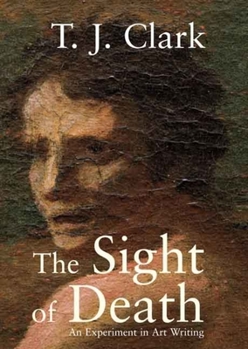The Sight of Death: An Experiment in Art Writing
Select Format
Select Condition 
Book Overview
A renowned art historian confronts the specific powers of painting, and the hold of the visual image on the viewer's imagination
Why do we find ourselves returning to certain pictures time and again? What is it we are looking for? How does our understanding of an image change over time? In his latest book T. J. Clark addresses these questions--and many more--in ways that steer art writing into new territory.
In early 2000 two extraordinary paintings by Poussin hung in the Getty Museum in a single room, Landscape with a Man Killed by a Snake (National Gallery, London) and the Getty's own Landscape with a Calm. Clark found himself returning to the gallery to look at these paintings morning after morning, and almost involuntarily he began to record his shifting responses in a notebook. The result is a riveting analysis of the two landscapes and their different views of life and death, but more, a chronicle of an investigation into the very nature of visual complexity. Clark's meditations--sometimes directly personal, sometimes speaking to the wider politics of our present image-world--track the experience of viewing art through all its real-life twists and turns.
Why do we find ourselves returning to certain pictures time and again? What is it we are looking for? How does our understanding of an image change over time? In his latest book T. J. Clark addresses these questions--and many more--in ways that steer art writing into new territory.
In early 2000 two extraordinary paintings by Poussin hung in the Getty Museum in a single room, Landscape with a Man Killed by a Snake (National Gallery, London) and the Getty's own Landscape with a Calm. Clark found himself returning to the gallery to look at these paintings morning after morning, and almost involuntarily he began to record his shifting responses in a notebook. The result is a riveting analysis of the two landscapes and their different views of life and death, but more, a chronicle of an investigation into the very nature of visual complexity. Clark's meditations--sometimes directly personal, sometimes speaking to the wider politics of our present image-world--track the experience of viewing art through all its real-life twists and turns.
Format:Paperback
Language:English
ISBN:0300137583
ISBN13:9780300137583
Release Date:April 2008
Publisher:Yale University Press
Length:272 Pages
Weight:1.36 lbs.
Dimensions:0.7" x 5.8" x 8.0"
Customer Reviews
1 rating
Dwelling Beautifully on "Affliction"
Published by Thriftbooks.com User , 16 years ago
Reviewed as a radical departure in art writing, it is a departure only from the postmodern mordancy. Although a good book, with some insights about the Poussin's Landscape with a Calm and Landscape with a Man Killed by a Snake, I became bored with Clark's diary of his somewhat predictable relationships with the paintings. His views are motivated by seeing "A socialism, if that's what we shall persist in calling it, that starts from misfortune, pain, and death." p 240 His response to these paintings and his own emotions dwells on "Affliction, misfortune, distress-of course Landscape with a Snake matters preeminently, and has held my attention so long, because it is my example of a coming to terms with the horror of nature that posits a "Huerte, huerte" ["Today, today" referring to Bach's Actus Tragicus] here in the horror, now in the moment of revulsion." The horrors, to me, are smallish in the whole of Poussin's landscapes, somewhat like Breughel's Landscape with the Fall of Icarus. I am not moved by Clark's socio-philosophy, but his writing is fluid and personal to some extent.






